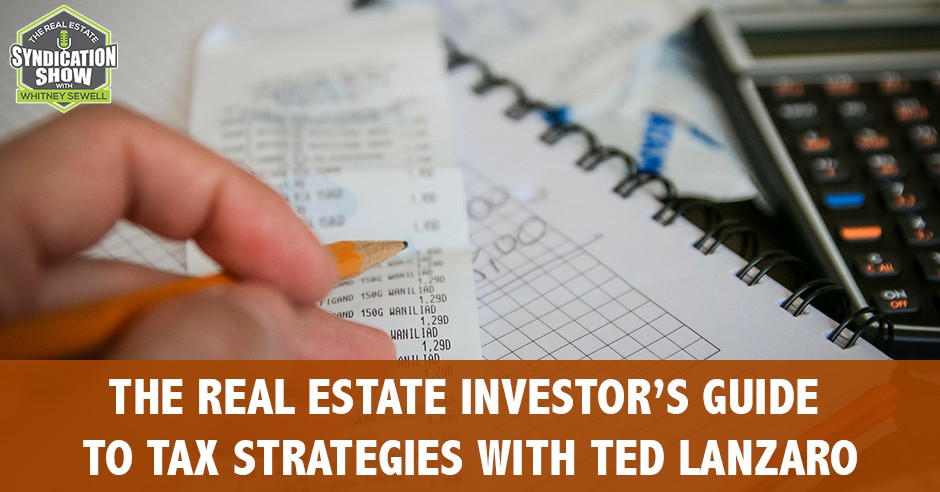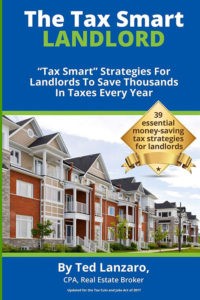
Listen to the podcast here:
The road to becoming a real estate professional takes sacrifice and a lot of guts. Ted Lanzaro shows us his business’ best practices in terms of understanding real estate investing tax strategies and keeping records. Ted is a Certified Public Accountant and a real estate investor with over 29 years of real estate consulting and investing experience. He’s the author of The Tax Smart Landlord, a book of tax strategies for real estate investors and has helped thousands of investors nationally save millions of dollars in taxes in his career. He goes into the three types of real estate investors from a tax standpoint as well as the importance of record keeping. As he gives some real estate tax strategies, Ted advises anyone wishing to be in the business to talk to a professional about tax ramifications.
Our Gracious Sponsor:
Are you tired of answering emails from investors about when they’ll receive their K-1s?
Let The Real Estate CPA handle the accounting and taxes on your next syndication and they’ll file your tax returns by March 15th so you can get K-1s to your investors by the individual filing deadline on April 15th.
Not only will this reduce headaches, but it will help you retain investors over the long-term by improving investor experience.
The Real Estate CPA is now offering a Special Virtual Workshop to the listeners of The Real Estate Syndication Show on How to Answer Tax Related Questions from Your Investors!
Learn more today by visiting: http://bit.ly/Real_Estate_CPA
—
Watch the episode here:
The Real Estate Investor’s Guide To Tax Strategies with Ted Lanzaro
CPA Ted Lanzaro gives some real estate investing tax strategies, covering three types of investors from a tax standpoint and the importance of record keeping.
Our guest is Ted Lanzaro. Thanks for being on the show, Ted.
Thank you for having me.
Ted is a Certified Public Accountant, CPA and a real estate investor with over 29 years of real estate consulting and investing experience. He’s the author of The Tax Smart Landlord, a book of tax strategies for real estate investors. He has helped thousands of investors nationally save millions of dollars in taxes in his career. Ted, thank you again for your time and sharing your expertise. With 29 years in experience, this is a no new thing for you and I appreciate the opportunity to learn from you. Give the people a little more about this, who you are and what your focus is.
The focus of my tax practice is representing real estate investors from a tax consulting standpoint and developing customized strategies for them because not everybody is exactly the same. People have different situations, so the tax strategy that I talk about in The Tax Smart Landlord book has to be tailored to a person’s specific situation. As an example, someone who is a real estate professional would have a different set of circumstances than one of the limited partners in your syndication.
You’ve got to find somebody that will be a tax strategist as opposed to calling themselves a CPA who’s going to do your taxes. Would you agree?
That’s accurate. I have an approach that I take with my clients and that approach is proactive. Most of the stuff that we do, we’re doing during the year and right before the end of the year, not after the fact, not after the year-end. I’m not the kind of CPA where you show up with your shoe box on April 10th and get your taxes done. I’m the kind of CPA who is involved in my clients’ businesses and wants to be involved in my clients’ businesses and encourages my clients to talk to me during the year about what they’re doing. I always tell clients, “There are a lot of times that you need to call me. When you’re buying a property, when you’re renovating a property, when you’re selling a property and right before year-end, we should be talking at a minimum.”
I have investors that contacted me and asked, “Do you have somebody that can help me with this?” They have a CPA who they may have used for years and years but they need a tax strategist, somebody that’s going to dive into their specific scenario. How do we find somebody like that like yourself? There may be some questions that we should ask the CPA when we’re developing that relationship to find out if they’re going to sit down with us like have that call to figure out with our specific scenario, what’s best as opposed to filing our taxes for us?
There are a lot of fantastic CPAs. A lot of them specialize in different things. I am a real estate CPA because I’m a real estate investor also. It came naturally. I started out several years ago. I started working with real estate investors and saw what was going on and said, “I could do some of this myself.” I started my investing career buying single-family and multifamily properties down in Southeast Florida, Fort Lauderdale area. As I started investing, I also started going to real estate investment club meetings and met other investors. They found out I was a CPA and they asked me to start doing tax presentations for these clubs. I started going around and speaking. The more I did that, the more clients I got. The biggest question that you can ask is, “Are you also a real estate investor?” That’s why my clients hire me because I speak their language. I can go and walk through a building and tell you within 5% how much repairs are going to be needed. I can write a scope of work to build out a building or something. It’s those kinds of specialized skills that are what my clients like about working with me.
Finding that CPA that’s in this business as well, they’re also going to have a different take on the business if they’re in it and investing day-to-day. You mentioned the real estate professional status, could you elaborate on what that is for our audience that hasn’t heard of that and maybe some of them has but is not clear what that actually means.
There are three types of real estate investors, essentially from a tax standpoint. You have your passive investors. Those would be the equivalent of your limited partners in your syndications. They’re not part of the decision-making, they’re putting their money in and for a return on their investment. The second type would be an active investor. If you’re an active investor, you might be somebody who’s managing your own properties. You’re the guy who’s putting the tenants in, calling the plumber when the toilet clogs, those kinds of things. As long as you put in enough hours, you’re allowed to deduct up to $25,000 a year against your ordinary income, assuming that your ordinary income doesn’t exceed $150,000 a year. Once your adjusted gross income exceeds $150,000 a year, then you’re basically phased out and any losses you take on new real estate are carried over.

If you’re a real estate professional, that’s somebody who works full-time in the real estate business, either as a developer, broker or syndicator. Real estate agents can qualify also. It’s people that are doing that and are documenting at least 750 hours a year and it’s more than half of what their total work activity is. If you do that, you have the ability to take unlimited losses against your ordinary income. A real estate broker who has a $40,000 loss on rental property could allocate that $40,000 loss against his $200,000 of real estate broker income during the year, assuming that he keeps track of the hours in order to qualify as a profession.
It’s going to benefit those that can do it full-time. They’re able to be a real estate professional. Should we all pursue to be a real estate professional if we’re doing this full-time?
If that’s all you’re doing, then you should be. If all you’re doing is working in the real estate business, there are a few tricks to this because your work in the real estate business could be simultaneous as a landlord, a broker or a syndicator. You could be doing multiple things. There are some tricks to it. You have to make an election to aggregate your activities in order to be considered a professional because what the IRS says is it’s not just 750 hours. It’s 750 hours per property unless you elect to do that aggregation. There’s a trap built into the rules. What I tell people is, one is it’s a two-sentence election on your tax return.” For me, it’s making sure I check the right box on my software when I’m doing your return and I have a checklist to make sure that I do that every year.
On your end, it would be making sure that you have a log or you’re using some app that tracks your work times so that you can prove that you have 750 hours of time in per year, that’s more than half of what you do. I had a client who has a full-time job and she said to me, “I’m a real estate professional.” I said, “I don’t think you qualify. You have a full-time job as an IT person.” She said, “No, but I also work 2,000 hours at least in my real estate business and I can prove that. I work more than half of my time in real estate.” I said, “You work 2,000 hours as an IT person and 2,000 hours as a real estate professional, when do you sleep? I don’t think you qualify and you don’t have a log.” She said, “You’re fired. I’m going to do my taxes myself and I’m going to take the real estate professional stuff.” I said, “That’s okay. Do what you want to do.”
Two years later, the phone rang, I picked up the phone and it was her and she said, “I got called out to the IRS’ office. They’re questioning my real estate professional status. Can you help me?” I said, “No, I told you. You were wrong. I can’t help you. You don’t need me now. You don’t need a CPA, you need a lawyer or maybe a magician. There’s nothing I can do. You’re going to have to pay the extra taxes because you don’t qualify and I told you that.” It’s one of those things where if you’re legitimately in the business, it’s an excellent opportunity to be able to deduct the rental losses that most of the time are going to come from depreciation because as real estate investors, we’re not buying real estate to lose money. We’re buying real estate to make money and have that money sheltered by the depreciation on the property.
[bctt tweet=”Using a proactive approach with clients is an ideal step in property selling.” username=””]
The people who are working, they have a W2 job, could they still claim this? I’ve heard similar stories where people are trying to log their time. They claimed they worked as many hours in real estate. Is there ever a time where that would work, where I have a W2 job or position but I can still claim the real estate professional status? I just have to make sure I’m working more hours in the real estate and I’m logging that time up to 750 hours or more. Is that a major red flag and I shouldn’t even pursue that?
It is a big red flag when you have a W2 income from somewhere else but that’s where keeping the log comes in. Let’s say you have a W2 job that was only 1,000 hours a year. It’s a part-time job. Some people can do that. You spent the other half of your time working as a real estate broker, a syndicator or developer. In those scenarios, you put in 1,100 hours, you’ve got over 750 hours and you’re more than half because you’ve got 1,100 real estate hours compared to your 1,000 W2 hours. As long as you’ve tracked that, then you don’t have a problem. You may have a larger risk of audit but when you do get called into the IRS’ office or they’ve written a letter and requested your log, you have it all ready, “Here you go, here’s my log,” end of the story. It’s all good as long as you have that record keeping in place. That’s why every speaking engagement that I do starts with a lecturer about record keeping for the people. Record keeping is the foundation of literally every strategy that I use with my clients.
Do you have a way to log those hours if we are a real estate professional? Do you have some best practices for logging that time?
I always tell people whatever’s most comfortable for you on what you’re going to use because I can give you an app and you might hate it and you’re not going to use it. It could be anything as simple as a pad of paper that I write down my hours every day. It could be an Excel spreadsheet, it could be some app. I would rather have a good piece of paper than an app you didn’t use. I’d rather have a good spreadsheet. The same thing goes with recordkeeping for anything else. I can tell you what the best thing would be for you to use but if you don’t want to use it or you’re like, “This is too hard,” then I would rather have it written down on a piece of paper.
Ted, why don’t you share a little bit of that with us as far as the recordkeeping? Obviously, it’s so important or else you wouldn’t share it every time. Maybe you can share a little bit of that and enlighten us on some recordkeeping tips.

Recordkeeping is the foundation of all of the tax strategies that we use. There are a lot of opportunities, especially with the new tax cuts and JOBS Act. There are a lot of opportunities for real estate investors to take advantage of the tax laws but there’s also the thing that Congress put in there that was a recordkeeping requirement. If you’re going to take real estate professional status, you want to log. If you’re going to deduct your miles, you want a miles log. If you’re going to take the home office deduction, you’d better have a good spreadsheet that shows all of your housing expenses. If you’re going to take the qualified business income deduction, you better be able to show that you qualified.
Even recordkeeping from the standpoint of, “I’m a syndicator, I’m putting people’s money into deals. Those people may actually ask me for reports at some point and say, “I’d like to see a PO of the property. Where’s my K-1?” Having really good recordkeeping facilitates your ability to provide reports to your limited partners, in addition to the taxation issue. One of the things that I tell people is, “You need a good system that basically makes sure that you’ve got everything that you did into whatever system you use.” For example, I have clients that use QuickBooks for accounting for the property. If I have a company, let’s say it owns an apartment building. I make sure that every deposit that I’ve put in and every check that is written for that property. I make sure that I reconcile my bank account every month and all of my deposits went into my bank account and all of my bills got paid out of the bank account. My insurance, the real estate taxes, the mortgage payment, the distributions to my limited partners, all of those things came out of that same account.
If I reconcile that bank account at the end of every month, I know I’ve got all of the transactions that occurred during that month. If you do that, then you can be sure that you have all that information and it’s the same thing with compliance. When you’re renovating an apartment building, for example, you should be keeping track of who you’re paying and how much you’re paying them because ultimately the IRS puts the responsibility on you to fill out those 1099s for those contractors and subcontractors that you’re using to do the work. If you don’t do that, it’s possible, not likely, that if you were to get on to that, the IRS could come back and take those deductions away or the case of a renovation on the property maybe take some of that cost basis away because you didn’t do the necessary compliance work, the file, those 1099s for the contractors that you used.
A lot of people use contract labor. We should be sending 1099s to those folks.
If they’re an individual, an LLC or partnership and you’ve paid them over $600 a year for the work that they’ve done, then you’re required to send them 1099 for their work. The way that you go about doing that is you have them fill out a W-9. I always tell my investor clients to have them fill out the W-9 form before you write them a check. If at the end of the year, you’re chasing around contractors trying to get their tax information, you’re probably not going to get it. What you’re going to get is, “Sorry about that. I didn’t really want that 1099.” Before you ever write them a check, you get the form W-9, get their insurance information and probably have a subcontract because of some standard agreement that you’re using with your subs. If you have all of that information, when the time comes to do the 1099s, they’re easy to do.
[bctt tweet=”Clients hire you when you speak their language.” username=””]
Get the W-9 before you write them a check. Even if they have an LLC, say it’s the John Jones Construction Company, we’ve hired them to come put a roof on, should I still get them to fill out a W-9?
Yeah, if they’re an LLC, a partnership or an individual. The only companies that are exempt are corporations. If it were John Jones Inc., you wouldn’t have to send them 1099. With John Jones LLC, you do.
What about this bookkeeping on the backend? What’s the easiest way to make sure all this is tracked? Do most people hire a service like yours to do things like that or how do they do that?
We certainly do that work for people and we’re happy to do that. Most people I find will either have an in-house person doing it. A lot of my clients are like, “I’m going to try to do it myself.” Maybe them or their wives, their spouses will do either the QuickBooks or the AppFolio or whatever they’re using. There is a lot of really good software out there. It’s a matter of making sure that you have a pretty good idea of what you’re doing. I’m going to use QuickBooks as an example. I would rather have a good spreadsheet than bad QuickBooks because if you do it wrong and I have to go and clean it up, that’s probably more costly to you than if you had a bookkeeper who knew the program do it right the first time.
If we have somebody in-house and they’re doing an Excel sheet, what’s the best way for them to categorize things like that? What are some big-ticket items that we need to make sure we’re tracking?

Obviously, all of the real property expenses and things like mortgage interest, real estate taxes, insurance, repairs or capital improvements because those are the things where you’re going to have the 1099 on people. From the inflow side, make sure that you’re collecting everybody’s rent and you know who owes you so that if you have a tenant that starts missing payments, you have a system in place to know that the tenant in 1A didn’t pay the rent this month. It’s time to start the collection process.
What would you tell a syndicator that’s getting into this business? Something they have to know before they dive into the syndication business from your standpoint.
From an accounting and tax standpoint, it would probably be a great idea to go and talk to someone like myself about the tax ramifications of doing that. What can you expect as a syndicator to be your tax ramifications? What are the recordkeeping requirements? What should you be doing when you’re taking other people’s money and investing it to make sure that you’ve got adequate safeguards in place to be able to provide them with information should they need it? Things do go bad. If something ever were to go bad, you would want to be able to show a report, “Here is some extra money we had to pay.” You have to be able to provide reports and information as a limited partner to show that we’re doing all the right things.
What’s the number one thing that’s contributed to your success?
The number one thing that’s contributed to my success is the fact that I’ve concentrated on my niche, which is real estate investing. It’s something that I’m both interested and passionate about. I can sit and talk about real estate all day. When you do what you’re interested in, what you really love, then it comes through to your clients and it makes a difference in your ability to do it well.
How do you like to give back?
I do quite a bit of work with people, with real estate investors. There are sometimes people who I know could use a leg up getting started and I won’t charge them for time doing that. This person looks like a good person and I’m going to give a scholarship to them, give them some information basically on how to get started. We work in a community with all the various charitable needs, whether it would be a food drive. I like animals, so helping people get animals adopted. It’s always a lot of fun.
Ted, thank you again so much for being on the show. I appreciate your time. I look forward to having you back so we can discuss some other topics that every real estate syndicator needs to know. Tell them how they can learn more about you and your company.
You can learn more about me by going to my website at www.LanzaroCPA.com. My contact information is there and my phone number at the office is (203) 922-1742. Anybody who sees this probably has some real estate questions, I’m always available. I work in the office during the day and I’m happy to answer people’s questions.
Thank you so much, Ted. I appreciate your time and sharing your expertise. I hope the audience reach out to you. I hope they also go to Life Bridge Capital and connect with me. Go to the Facebook Group, The Real Estate Syndication Show and join so we can all learn from experts like Ted and grow your businesses. We will talk to you soon.
Important Links:
- Ted Lanzaro
- The Tax Smart Landlord
- QuickBooks
- AppFolio
- www.LanzaroCPA.com
- The Real Estate Syndication Show – Facebook group
About Ted Lanzaro
 Ted Lanzaro is a Certified Public Accountant, real estate investor, real estate broker, author and speaker with over 29 years of real estate tax consulting and investing experience. He runs Lanzaro CPA, LLC a boutique CPA firm specializing in accounting and taxation for the real estate industry. For the past 29 years, he has helped thousands of real estate business owners, entrepreneurs and investors all over the United States implement cutting edge real estate investing tax strategies that save them thousands of dollars annually on their taxes.
Ted Lanzaro is a Certified Public Accountant, real estate investor, real estate broker, author and speaker with over 29 years of real estate tax consulting and investing experience. He runs Lanzaro CPA, LLC a boutique CPA firm specializing in accounting and taxation for the real estate industry. For the past 29 years, he has helped thousands of real estate business owners, entrepreneurs and investors all over the United States implement cutting edge real estate investing tax strategies that save them thousands of dollars annually on their taxes.
Mr. Lanzaro is the author of “The Tax Smart Landlord” and “The Tax Smart Landlord” toolkit as well as over 100 articles on taxation for the real estate industry specifically for investors, landlords, “flippers”, and developers.
Ted is a sought after speaker and has spoken all over the United States to groups of real estate investors and business owners on the taxation of real estate.
Love the show? Subscribe, rate, review, and share!
Join the Real Estate Syndication Show Community:



